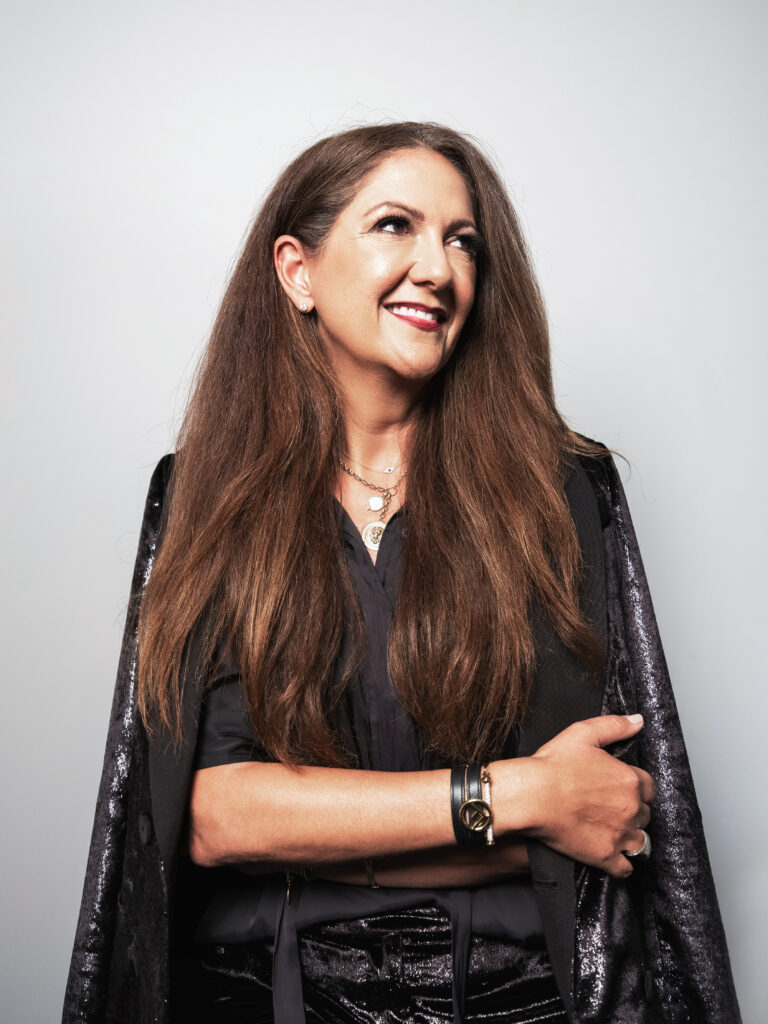Above: Sephora North America CEO Artemis Patrick (photo by Jessica Chou/WWD via Contour RA by Getty Images)

Patrick says UC Santa Cruz taught her “listening skills and understanding beyond ‘ABCD, the next promotion, the next title’”— values she’s carried forward in her career. (Photo by Jessica Chou/WWD via Contour RA by Getty Images)
Artemis Patrick’s ascent into leadership roles at global prestige beauty retailer Sephora, a career journey spanning over 17 years, has meaning that goes far beyond skin-deep. This April, after serving in other high-level leadership positions, Patrick (Oakes ’93, economics) will become Sephora North America’s first female CEO.
“This is in beauty, where the majority of our customers are women or identify as women,” she says. “It’s time, and exciting since the company opened its first store in the U.S. in 1998.”
She’s proud to set an example for her daughter as well as “all young girls and women that something like this is possible. Representation is very important to me.”
Her own lived experience demonstrates the value of inclusion, documented in the video “We Belong to Something Beautiful: Artemis’s Story” on Sephora’s YouTube channel. Her early years tell a moving story of immigrating to the U.S. in 1979 at not yet 8 years old, fleeing Iran during the revolution.
“We had to leave very quickly because my father was one of the pilots for the Shah,” she says, referring to Mohammad Reza Pahlavi, whose monarchy was overthrown that year. “That was difficult for me. I was very close to my mother’s side of the family, especially my grandmother, who was practically raising me while my mom was getting her degree at the University of Tehran.”
Patrick arrived in the U.S. speaking no English and having left everything behind. When her mother returned to Iran “for what she thought would be a temporary visit,” she got stuck there. Her father struggled, having gone from working for royalty to trying to find a job as an immigrant. At age 9, Patrick entered the foster-care system, living in a group home for a year, then moving in with foster parents.
Her foster parents steered her toward the UC system. Upon visiting UC Santa Cruz, she walked around the campus and was sold.
“I loved how spread out it was and the idea of the colleges, because although it was really big, you could come together in a college and create community that way,” she says.
During the time of narrative evaluations, “The no-grade thing was a big deal.” She’d read each one, “pore over it and think, ‘How can I do this better, how can I improve?’ and, ‘Wow, this professor saw something in me that I didn’t even see,’” she says. “That was so valuable. It taught me listening skills and understanding beyond ‘ABCD, the next promotion, the next title,’” values she’s carried forward.
In a business that curates hundreds of carefully selected brands, helping brands tell their stories is a collaborative process from working with—and listening closely to—brand founders.
“It’s our job to get out the story of that small little indie brand,” she says. “It’s part of our DNA. There is nothing more satisfying than meeting a founder, then seeing their brand come to life and become successful.”
One such moment hit close to home. Patrick recalls meeting Mazdack Rassi, one of the founders of Milk Makeup and Milk Studios in New York City. Rassi is also Iranian, and the two discovered they most likely came over on the same plane.
“And here we are.… Milk is one of our most successful clean makeup brands globally,” Patrick says. “Those are the stories where, if we don’t listen, we miss so much.”

